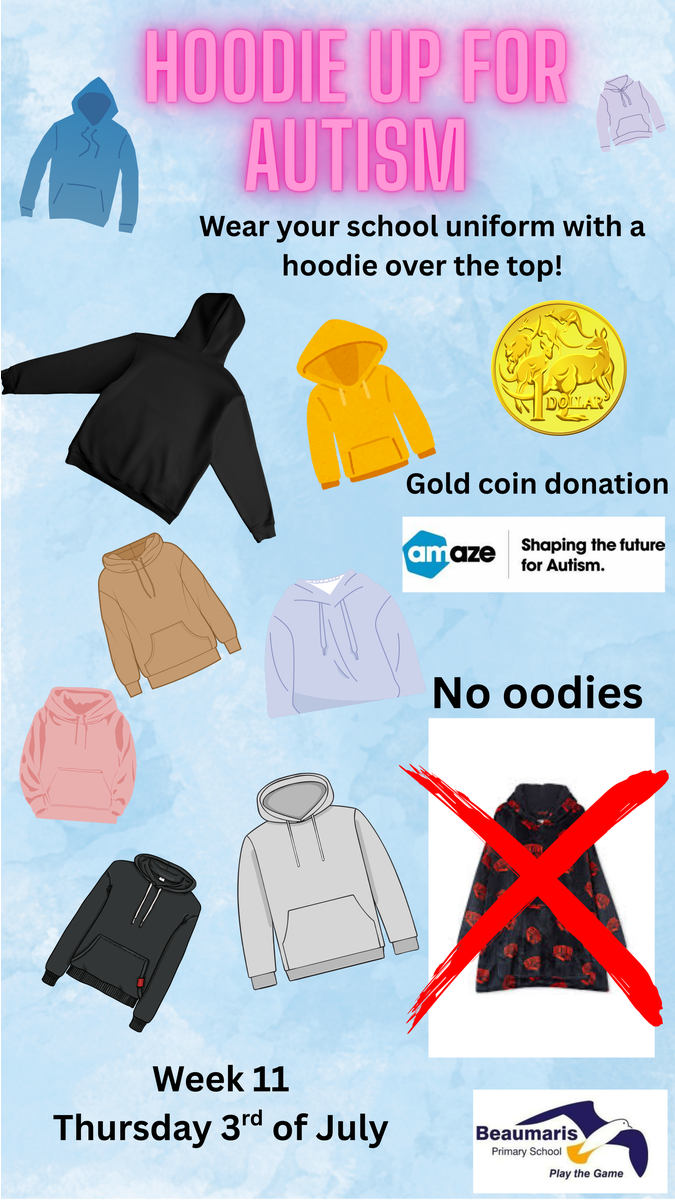Topic Spotlight

Autism Awareness
This fortnight's spotlight is on Autism.
In March, our school celebrated Neurodiversity week. This was an opportunity for the school to celebrate the strengths and talents of people with learning differences such as ADHD, autism, dyslexia, dyspraxia, bipolar and Tourette Syndrome.
Following on from that, we will be celebrating
Hoodie Up Day on Thursday 3rd of July (last week of Term 2). This is a day for students to show their support for Autistic people and their families by wearing a hoodie or other jumper to school that makes them feel safe. Thank you to Eamon, and JSC Leaders, Rachael, Alfie, Joseph and Billy, for organising and promoting this upcoming day.
Below, Mrs Meg McSwain, our Learning Specialist for Disability and Inclusion, has shared information, that was shared from our Disability Inclusion DET Regional team, on what Autism is and how we can all create an inclusive school environment.
What is Autism? Medically, autism is considered a developmental disability. It is often linked with differences in communication and sensory processing . These differences can create challenges, especially in environments not designed to accommodate neurodiversity . The social model of disability flips the narrative, suggesting that societal barriers, rather than autism itself, are disabling. With the right accommodations, the social model suggests, many of these barriers can be eliminated, for example, to a wheelchair user, stairs are a barrier to accessibility. By providing a ramp, you not only create access for the wheelchair use, but for all individuals.
Autistic people express a variety of perspectives - some view it as a part of their identity and a unique strength, others as disability. While autism brings unique strengths and perspectives, it is important to recognise the challenges autistic people face due to societal barriers and systemic inaccessibility. Viewing autism purely as a difference, without acknowledging these challenges, can undermine the need for accommodation and support - ultimately harming autistic individuals. Recognising disabling aspects of autism ensures that society prioritises inclusion, accessibility and equal rights for all. The human rights model of disability views people with disabilities as rights-holders, recognising their inherent dignity and equality. It emphasizes that disability is a natural aspect of human diversity and that people with disabilities are entitled to the same rights as everyone else, including the right to live independently and participate fully in society.
Autistic people have preferences about how autism is talked about. Some people prefer ‘autistic person’ - research is indicating that this 'identity-first' language is preferred by the Autistic community, however others prefer ‘person with autism’ (person-first language). We respect everyone's views and use both approaches.
Inclusive education means that all members of every school community are valued and supported to fully participate, learn, develop and succeed within an inclusive school culture. All children have the right to enrol in their designated neighbourhood mainstream government school. Autistic children have the same education rights as other students.
The aim is to create safe and inclusive school environments for students with disabilities and additional needs. It is also important to consider the intersecting identities and needs that schools may need to consider, including - co-occurring disability or additional learning needs; gender identity; sexual orientation; being an Aboriginal or Torres Strait Islander person; race; cultural identity; speaking a language other than English; social factors; economic factors; experience of abuse, neglect or family violence.
If you would like more information, please refer to the following resources:
AMAZE - I am... a parent or carer - Amaze - shaping the future of autism
Autism Education Strategy - Autism Education Strategy | schools.vic.gov.au
I CAN - I CAN® - Australia's Largest Autistic-led Organisation
Yellow Ladybugs - Yellow Ladybugs – focus on girls and women with autism
Diverse Learners Hub - Diverse Learners Hub | vic.gov.au
Positive Partnerships - Positive Partnerships | About Autism
Raising Children Network - Autism | Raising Children Network

